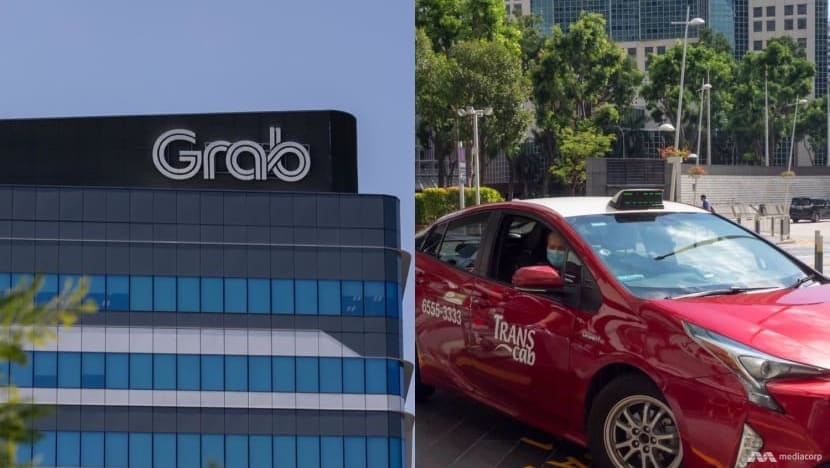Competition watchdog begins in-depth review of Grab's proposed Trans-cab acquisition
The Competition and Consumer Commission of Singapore found that Grab's commitments to address anti-competitive concerns were insufficient.

Grab had announced plans to acquire Singapore's third-largest taxi operator Trans-cab in 2023. (File photo: TODAY)

This audio is generated by an AI tool.
SINGAPORE: Singapore's competition watchdog has started an in-depth review into tech firm Grab's proposed takeover of taxi operator Trans-cab.
In a statement on Wednesday (Jan 31), the Competition and Consumer Commission of Singapore (CCCS) said that they embarked on the more extensive process after an initial review found that Grab's proposed acquisition might create barriers for rival platforms.
Grab's planned acquisition of Singapore's third-largest taxi operator covers Trans-cab’s taxi and car rental business, maintenance workshop and fuel pump operations.
If the merger - first announced in July - goes through, Grab's private-hire car rental arm Grab Rentals will acquire 100 per cent of shares in Trans-cab.
Both parties initially expected to close the deal in the fourth quarter of 2023.
Related:
Grab and Trans-cab have argued that the acquisition will not result in a substantial lessening of competition, citing "minimal overlaps" between them; a lack of prohibitive barriers to entry; and a highly fragmented and competitive rental market.
On Oct 31, 2023, Grab proposed some commitments to address the competition concerns identified by CCCS.
"CCCS reviewed the commitments proposal and found that, without the benefit of an in-depth review, it was unable to conclude that the commitments proposal adequately addressed the competition concerns CCCS identified," said the watchdog on Wednesday.
"For example, it did not adequately address the concern that the proposed acquisition may give Grab the ability and incentive to leverage its ownership of the Trans-cab fleet to induce Trans-cab drivers to use Grab’s ride-hail platform, whilst discouraging them from using rival ride-hail platforms."
The tech firm's proposed commitment duration of two years, as well as their self-policing monitoring mechanism, were also deemed to be insufficient, said CCCS, adding that Grab was informed on Nov 24, 2023 that it could not accept the proposal.
Grab had argued that the merger would ultimately benefit customers and improve driver earnings.
"Digitalising Trans-cab’s fleet will improve driver productivity and taxi availability so that consumers can get a ride more easily," Grab said in October.
The company also said that Trans-cab drivers will still have the option of being on multiple ride-hailing platforms and pick up street hail rides.
NEXT STEP OF THE REVIEW
Where CCCS' initial study was a "quick" review aimed to be completed within 30 business days, the in-depth review will be completed within 120 business days due to its added complexity, it said.
The next phase of the watchdog's review "entails a more detailed and extensive examination of the merger situation", and will require it being given access to more information regarding the merger parties and the markets in question.
During this phase, Grab may propose revised commitments to address any competition concerns identified.
After the in-depth review, CCCS will decide on the proposed acquisition.
Grab's planned acquisition of Trans-cab follows the merger of Strides Taxi and Premier Taxis in May to form Singapore's second-largest taxi operator.
In 2018, CCCS fined Grab and ride-hailing platform Uber S$13 million (US$9.7 million) over their merger.
The deal led to a substantial lessening of competition in the market, the watchdog said then, highlighting Grab’s increased prices and changes to its loyalty programme after it bought over Uber's Southeast Asia operations.



















